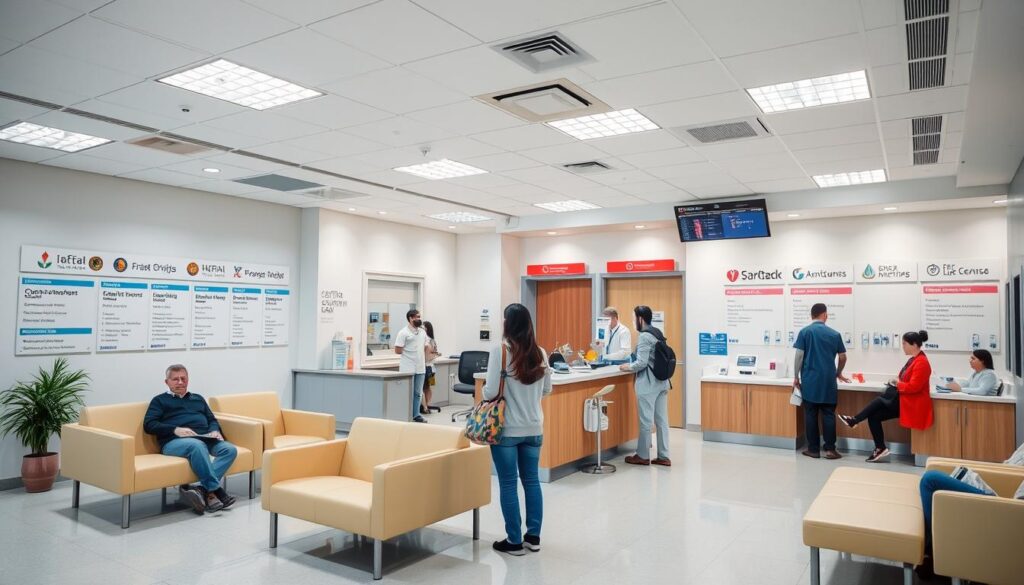Last Updated on: 3rd February 2025, 02:36 pm
As the world becomes increasingly interconnected, the allure of relocating to a new country is stronger than ever. Many individuals, including retirees and digital nomads, are prioritizing the search for countries with the best healthcare systems. In 2025, understanding expat healthcare will be crucial in navigating this new lifestyle, as the quality and accessibility of healthcare services vary widely across the globe. With various factors influencing their choices, such as healthcare affordability, accessibility, and the overall expat experience, individuals must weigh their options carefully.
Countries with top-ranked healthcare systems provide valuable insights for those considering relocation. For example, in 2023, Colombia’s healthcare system ranked one point higher than the US on the World Health Organization Healthcare Index, dropping from 22 to 35 out of 191 countries. This highlights how some nations are offering high-quality healthcare services to expatriates looking for affordable options within their reach1. Additionally, countries like France and Germany stand out for their robust healthcare infrastructures, making them prime selections for expats seeking peace of mind regarding their medical needs23.
As the expat community grows, the significance of high-quality healthcare cannot be overstated. Throughout this article, we will explore the best countries for expat healthcare in 2025, offering insights into how to make informed choices when selecting a new home abroad.
Key Takeaways
- Understanding the quality of healthcare systems is essential for expats.
- Countries like Colombia and France provide high-quality healthcare services.
- Affordability and accessibility are key factors for expatriates choosing a new country.
- Healthcare systems vary widely, influencing expat experiences.
- Germany and other European nations are recognized for their robust healthcare infrastructure.
Contact us if you are Interested in Buying Property Abroad!
Introduction to Expat Healthcare Challenges
Expat healthcare challenges can be daunting for those living far from their home countries. Navigating new healthcare systems often presents unique hurdles, especially regarding healthcare accessibility. Language barriers complicate communication with medical professionals, making it tricky for expatriates to articulate their international living medical concerns.
Many expats fear securing quality medical services that cater to their specific needs in foreign environments. Understanding the nuances of insurance coverage abroad is critical. Ensuring proper coverage ensures that expats can access timely and adequate medical care, which is vital to maintain their overall well-being.
Expatriates frequently experience stress when faced with unfamiliar healthcare protocols and varying levels of care quality. Such situations not only affect their health but may also impede smooth transitions into their new homes. As worldwide travel continues to grow, addressing these expat healthcare challenges becomes increasingly essential.
| Challenge | Description |
|---|---|
| Healthcare Systems | Differences in rules and regulations across countries can lead to confusion. |
| Language Barriers | Difficulty in communicating symptoms or understanding medical advice. |
| Insurance Understanding | Varied insurance policies may hinder access to necessary treatments. |
| Quality of Care | Inconsistencies in care standards can affect treatment outcomes. |
| Access to Specialists | Limited access to healthcare professionals with specific expertise. |
Recognizing these challenges is the first step towards enhancing healthcare for expatriates around the globe. Maintaining a proactive approach can improve healthcare accessibility and ensure that expats can enjoy their new lives comfortably and healthily.
As the landscape of global healthcare continues to evolve, expats must remain informed about their options. With the right resources and support, they can mitigate the challenges and successfully navigate international living medical concerns456.
Understanding Global Healthcare Rankings
Global healthcare rankings provide valuable insights into the performance of healthcare systems around the world, offering a benchmark for comparing the international healthcare quality that expats can expect in different countries. Organizations such as the World Health Organization and the Legatum Institute analyze various metrics to assess these systems, including efficiency, accessibility, medical costs, and patient satisfaction.
As of 2025, Italy topped the CEOWorld Magazine’s Health Care Index with a score of 72.15, followed closely by Singapore at 67.22 and Iceland at 65.157. These rankings indicate that countries like Singapore deliver impressive health outcomes, including low child mortality and high life expectancies, making its healthcare system particularly attractive to expats8. New Zealand’s healthcare model, which integrates public and private services, also ensures comprehensive care and high-quality medical treatment, contributing to its favorable ranking globally8.
Canada is recognized for its universal healthcare coverage, eliminating out-of-pocket expenses for primary care and making it an appealing choice for expats seeking residency8. South Korea’s universal health insurance system also stands out, providing exceptional medical care and some of the best health outcomes globally, enhancing the country’s appeal for expatriates8. Additionally, Switzerland’s compulsory health insurance model assures universal coverage and wide access to healthcare services, promoting excellent health outcomes8.
These examples illustrate how different countries have developed healthcare systems tailored to the unique needs of residents, emphasizing the importance of thorough research for expats when planning healthcare access abroad. Understanding these global healthcare rankings can guide individuals in making informed decisions, facilitating smoother transitions to their new homes.
Importance of Healthcare Quality for Expats

Quality healthcare is essential for expatriates, influencing many aspects of their lives, including overall expat well-being. Access to efficient healthcare services ensures that expats can manage both chronic conditions and unexpected health issues effectively. A robust healthcare system not only enhances the ability to seek timely medical attention but also creates a sense of security when living abroad.
Denmark has emerged as a popular choice for expats and digital nomads due to its high ranking in healthcare quality8. Singapore’s healthcare system stands out for its efficiency and technology, consistently delivering impressive health outcomes such as low child mortality rates and high life expectancies8. Countries like New Zealand, Canada, and Switzerland offer various paths to access comprehensive healthcare, contributing to the fulfillment of resident needs8.
In Europe, numerous countries excel in healthcare services. Sweden funds its public healthcare system largely through taxes, with maximum out-of-pocket costs remaining relatively low9. Ireland also provides free public healthcare for a portion of its residents, while private health options can carry significant costs9. These frameworks allow expats to benefit from quality healthcare abroad, ensuring their health needs are met without excessive financial burdens.
The quality of healthcare systems globally varies significantly. In Colombia, the healthcare system outranked that of the US according to the World Health Organization Healthcare Index1. Private clinics often provide shorter wait times while still offering high-quality care comparable to North American standards1. France furthers this notion with a reimbursement system that helps expats afford the cost of necessary treatments, further promoting their well-being1.
Countries With Best Healthcare For Expats
Expats seeking quality healthcare will find several countries that offer robust healthcare systems. Understanding these systems is crucial for making informed choices about relocation. Below is a detailed healthcare systems overview that highlights notable options.
Overview of Healthcare Systems
Countries like Spain, Germany, and France provide comprehensive healthcare solutions for their residents. Spain offers universal health insurance coverage to all legal residents10. Germany boasts over 1,900 hospitals and nearly 150,000 doctors, ensuring that residents have ample access to quality medical care10. France’s system is designed to reimburse around 80% of hospital medical fees, depending on the level of coverage chosen10.
An Analysis of Healthcare Costs
Understanding the healthcare costs for expats is essential when relocating. In Sweden, public healthcare costs are covered mostly by taxation and government funding—95% by the state and just 3% by patients through nominal co-pays9. In contrast, private health insurance in Sweden is around 4,000 SEK (~$375) annually9. Meanwhile, the cost for basic health insurance in the Netherlands is approximately €138.45 (~$150.79) monthly, preceded by a deductible of about €385 (~$419)11. In Ireland, public healthcare charges can be as much as €54 (~$59) for doctor visits9. Comprehensive knowledge of these costs allows expats to plan their budgets wisely while enjoying quality medical services.
Top Healthcare Destinations in Europe

As expats seek optimal healthcare options in Europe, two countries stand out for their exceptional offerings: Germany and France. Both nations provide distinct advantages, making them top healthcare destinations in Europe. Understanding their healthcare systems can significantly impact the well-being of expatriates searching for reliable medical support.
Germany: A Leader in Expat Healthcare
Germany’s healthcare system is lauded for its comprehensive and accessible services. The country operates a dual system of statutory health insurance (GKV) and private health insurance (PKV), catering to the diverse needs of its residents, including expats12. This structure allows individuals to select a plan that best fits their lifestyle and budget, ensuring that necessary medical services are within reach.
Furthermore, the mandatory requirement for health insurance supports the overall quality of care. This enables 70% of surveyed individuals in the US to express a desire for similar free healthcare benefits in countries like Germany13. As such, Germany ranks high for expat-friendly healthcare options, attracting those looking for reliable medical assistance without exorbitant costs.
France: Affordable and Accessible Care
France offers a model of healthcare that emphasizes affordability and accessibility for residents and expats alike. The French healthcare system provides reimbursement of approximately 70-80% of medical costs through its state-provided Assurance Maladie health insurance12. This coverage significantly reduces out-of-pocket expenses, making healthcare France for expats an appealing option, especially for those concerned about managing costs.
Residents in France are legally required to have health insurance, with many opting for additional top-up insurance to cover various medical needs13. This structure creates a supportive atmosphere for expatriates, ensuring they receive quality care in a timely manner. The combination of extensive coverage and assistance makes France one of the most sought-after destinations for individuals moving abroad.
| Country | Healthcare System Type | Cost Coverage | Expat Benefits |
|---|---|---|---|
| Germany | Dual System (GKV & PKV) | Varies, generally high quality | Compulsory health insurance for all residents |
| France | Public Health Insurance | 70-80% of medical costs | Affordable care with additional top-ups available |
Through these insights, it’s clear why Germany and France remain top healthcare destinations in Europe. Their respective systems provide extensive coverage and quality services designed to meet the specific needs of expatriates.
Contact us if you are Interested in Buying Property Abroad!
Expat-Friendly Countries in Latin America

Latin America stands out as a haven for expatriates seeking accessible and high-quality healthcare. Countries such as Colombia and Mexico are essential players in the realm of expat-friendly healthcare Latin America. Both have been recognized for their affordability, efficient medical services, and overall satisfactory healthcare experiences.
Colombia: Quality Care at Reasonable Prices
Colombia healthcare quality has made significant strides, offering a mix of public and private healthcare options that rank impressively among global standards. Major cities like Bogotá and Medellín feature numerous accredited hospitals and clinics, providing care that rivals that of North America. The affordability of medical services is notable, drawing a large number of expatriates looking for cost-effective healthcare solutions.
Mexico: Accessible Healthcare for Expats
Mexico expat healthcare accessibility is evidenced by the fact that 1.5 million Americans have chosen it as their permanent home, making it the most popular country for American expats. The healthcare system is well-structured, with a plethora of English-speaking medical professionals and internationally accredited hospitals. This blend of accessibility and quality makes Mexico an attractive option for expatriates.
| Country | Healthcare System Type | Major Cities for Healthcare | Average Cost of Care |
|---|---|---|---|
| Colombia | Public and Private | Bogotá, Medellín | Low to Moderate |
| Mexico | Public and Private | Mexico City, Guadalajara | Affordable |
Understanding International Health Insurance

For expatriates, navigating the complexities of international health insurance is essential to meet their specific health needs. As medical systems differ considerably from one country to another, having adequate international health insurance provides a critical safety net. This type of insurance helps bridge gaps in health services, ensuring that expat health insurance needs are fully addressed.
The landscape of international health insurance presents various coverage options tailored for expatriates. For instance, providers like Cigna Global and International Medical Group (IMG) offer flexible policies that can be customized based on individual circumstances. Cigna Global provides multiple deductible and cost-sharing choices, while IMG’s Gold level plan is known for offering an excellent combination of coverage, benefits, and price14.
Moreover, it’s essential to consider what each plan covers. Key areas of coverage can include inpatient treatment, outpatient care, emergency services, and even preventive care like vaccinations. A comprehensive policy will typically encompass routine care, though levels of coverage can vary significantly across providers. As a result, expatriates should carefully evaluate each policy to ensure it meets their specific needs for medical emergencies and ongoing health care.
Factors that influence costs include age, medical history, location, and the extent of coverage selected. A well-rounded international health insurance plan should facilitate access to quality healthcare and mitigate unexpected expenses. Many plans offer incentives for in-network usage, which can lead to a reduced rate for doctor visits, reinforcing the significance of selecting the right coverage for expatriates14.
When applying for international health insurance, prospective policyholders will need to provide essential information such as their location, name, date of birth, nationality, and medical history. Ensuring all of this information is accurate will facilitate a smoother application process and help determine eligibility for various plans. Personalizing coverage can enhance the overall healthcare experience for expatriates, tying their diverse health needs to the right insurance policies.
In summary, selecting the appropriate international health insurance is vital for expatriates. It ensures that they have sufficient coverage and support regardless of where they are located, addressing varying expat health insurance needs effectively and confidently.
The importance of a tailored healthcare solution cannot be overstated.
Medical Facilities for Foreigners: What to Expect

When looking for medical facilities for foreigners, expats should familiarize themselves with the healthcare environment of their new country. Accessing quality healthcare abroad standards can greatly enhance their living experience. Knowing what to expect from healthcare services provides comfort and helps individuals make informed decisions about where to receive care.
Expat-Friendly Hospitals and Clinics
One of the key aspects of a smooth transition for expats is finding expat-friendly hospitals and clinics. In countries like Costa Rica, for example, the healthcare system is recognized for being one of the top 20 public healthcare systems globally, offering significant services to both citizens and expats alike15. Access to English-speaking staff and international accreditation is vital for tourists and expatriates seeking assurances in unfamiliar surroundings. Understanding the types of facilities available — public hospitals, private clinics, and specialized centers — can aid in selecting the right kind of care.
Quality Healthcare Abroad: Standards to Look For
Expats should look for specific quality healthcare abroad standards when selecting medical facilities. Countries such as France and Germany require residents to have health insurance, ensuring that residents receive adequate medical attention13. Certification by international health bodies and reviews by expat communities can provide additional layers of reassurance regarding the quality of care. With medical tourism in Costa Rica flourishing, especially in dental and optical care, expats find not only affordable services but also high standards of care15.
Healthcare Costs for Expats: Budgeting for Medical Care

Understanding healthcare costs for expats is vital for those living abroad; these expenses can vary significantly by location. Expats need to engage in effective budgeting for medical care to navigate these financial challenges successfully.
For example, an emergency room visit in the United States might cost between $700 and $3,400, with an additional overnight stay costing approximately $5,00016. Furthermore, costs can skyrocket during emergencies; air transport for evacuation could exceed $100,00016. Such figures illustrate the importance of thorough expat financial planning for health as unexpected expenses can arise at any moment.
According to research, the average medical claim for expats reached US$2,580 in 2021, with the USA experiencing the highest average claim at US$9,94117. This wide variance in medical costs underscores the necessity for expats to research the healthcare landscape of their host country to adequately prepare.
For routine care, prices can also fluctuate. For instance, in the U.S., a routine blood test without insurance costs around $300 to $65016. Dental treatments, like those in Indonesia, average around US$8,33617. As a result, expats should factor these potential costs into their financial plans.
Countries vary significantly in their approach to healthcare expenses. Understanding medical costs will enable expatriates to anticipate and manage expenses related to the healthcare system, making informed choices when it comes to seeking treatment. By staying informed and preparing financially, expats can ensure they receive quality medical attention while safeguarding their finances.
Medical Tourism Destinations: Why They Matter
Medical tourism is gaining traction as expats seek cost-effective treatment abroad without sacrificing quality. Countries such as Malaysia, with a remarkable score of 95 out of 100, offer some of the best healthcare globally, making it a prime destination for medical tourism destinations and healthcare travel advantages18. Following closely is France, scoring 93, known for its accessible and high-quality medical services18.
Thailand, another standout in this field, has established its reputation for affordable yet high-quality healthcare, achieving a score of 9218. Ecuador and Costa Rica further enhance the appeal of medical tourism with their combination of excellent healthcare at lower costs. Costa Rica has emerged as a leader in Latin American healthcare, thanks to its dual healthcare systems that cater to various needs18.
With the benefits of significantly reduced costs, Turkey now attracts international patients with medical services that can be up to 60% cheaper than those in Europe19. Places like Azerbaijan have successfully become known for dental treatments, with costs for single dental implants starting from $42519. Hungary and the Czech Republic also feature top-quality dental care at favorable prices. For instance, a single dental implant in Hungary averages $915, which remains considerably lower than costs in many Western nations19.
Traveling for healthcare has become a practical solution for many expats striving to manage their health while minimizing expenses. Countries embraced for their medical tourism services not only provide affordable options but also ensure that standards are met, thereby reassuring patients about their care and well-being. This evolving trend highlights the importance of staying informed about potential healthcare travel advantages that can lead to remarkable savings and healthy outcomes.
Conclusion
In summary, the best countries for expat healthcare offer a blend of robust healthcare systems, affordability, and accessibility, catering to the diverse needs of expatriates. The insights provided throughout this article underscore the importance of evaluating specific healthcare systems, associated costs, and available insurance options as critical factors in making informed expat healthcare decisions. Understanding the nuances of healthcare services can significantly impact the overall experience of relocating to a new country.
As expats consider their unique healthcare needs, regions such as Europe, Latin America, and the Middle East emerge as notable destinations. For instance, European nations generally operate on a universal healthcare system that allows expats various means to integrate into public healthcare frameworks, contingent on residency and contributions20. From the qualities of healthcare services to specialized expat-friendly institutions, securing adequate healthcare is crucial for a smooth transition into an international lifestyle.
Ultimately, final thoughts on expatriate health services highlight the necessity for comprehensive research and preparation. By leveraging available resources and understanding local healthcare dynamics, expatriates can better navigate their healthcare journeys, ensuring they receive the best possible care in their new environments. For further details on universal healthcare systems worldwide, visit this informative link that provides a deep dive into healthcare access in various nations21.
Contact us if you are Interested in Buying Property Abroad!
FAQ
What should expats consider when choosing a country for healthcare?
How can expatriates navigate language barriers in healthcare?
What are some common healthcare challenges faced by expats?
How are global healthcare rankings determined?
Why is healthcare quality important for expatriates?
Which countries are recognized for providing excellent healthcare to expats?
What role does international health insurance play for expats?
What can expats expect in terms of healthcare costs abroad?
What are the benefits of medical tourism for expats?
Source Links
- https://internationalliving.com/countries-best-healthcare-world/
- https://www.forbes.com/sites/rebeccahughes/2024/07/25/top-3-european-countries-for-expat-healthcare-according-to-experts/
- https://www.globalcitizensolutions.com/countries-with-best-healthcare-for-expats/
- https://finance.yahoo.com/news/15-european-countries-best-healthcare-202836829.html
- https://www.william-russell.com/blog/countries-worlds-best-healthcare-systems/
- https://www.internationalinsurance.com/health/countries-free-healthcare.php
- https://www.internationalinsurance.com/health/systems/
- https://www.deel.com/blog/what-country-has-the-best-healthcare/
- https://brighttax.com/blog/european-countries-with-best-healthcare/
- https://visaguide.world/international-health-insurance/best-healthcare-countries/
- https://expatsi.com/healthcare/14-countries-with-better-healthcare-than-the-united-states/
- https://health4travel.com/top-5-countries-with-best-healthcare-for-expats-in-europe/
- https://www.euronews.com/travel/2024/05/19/70-of-expats-move-in-search-of-free-healthcare-but-where-in-europe-do-they-get-it
- https://www.internationalinsurance.com/health/best-companies.php
- https://www.internations.org/costa-rica-expats/guide/healthcare
- https://www.internationalinsurance.com/resources/healthcare-costs-in-the-usa.php
- https://www.william-russell.com/blog/do-you-know-how-much-medical-treatment-costs-away-from-home/
- https://growingbolder.com/stories/top-5-destinations-for-quality-healthcare-abroad/
- https://www.linkedin.com/pulse/top-9-cheapest-country-medical-tourism-ziba-valehova-axapf
- https://agoraexpat.com/en/do-americans-need-health-insurance-in-europe/
- https://www.ncbi.nlm.nih.gov/pmc/articles/PMC10250784/
Best Countries According to Aparthotel.com
- Best Countries To Live In Europe
- Best Countries To Move To From Canada
- Best Country To Live In
- Top Birth Tourism Countries
- Cheapest Asian Country To Live In
- Cleanest Country In The World
- Countries With No Capital Gains Tax
- Countries That Allow Dual Citizenship
- Countries With No Income Tax
- Countries With No Inheritance Tax
- Countries With No Property Tax
- Easiest Countries To Move To From USA
- Easiest EU Country To Get Citizenship
- Hardest Countries To Immigrate To
- Highest Tax Paying Country
- Instant Citizenship Countries
- Least Corrupt African Countries
- Lowest Tax Countries
- Non Extradition Countries
- Safest Countries In Africa
- Safest Countries In Europe
- Safest Country In Asia
- Safest Country In The World
- Safest Latin American Countries
- Second Passport Countries
- Territorial Tax Countries
- Which Country Pays Highest Salary
- Most LGBT Friendly Countries
- Best Countries For Expats
- Best Countries for Work-Life Balance
- The Best Countries For Hiking Adventures
- Best Countries for Expat Healthcare
- Safest Countries For Women Travelers
- The Best Country For Safari Adventures
- Top Solo Travel Destinations for Adventure Seekers
- The Best Solo Trips For Women
- Best Countries For Disabled Veterans
- Top Countries for Plastic Surgery
- Top Countries for All Inclusive Resort Vacations
- Top Countries With The Best Food Worldwide
- Best Countries For Black Expats
- Top Countries for Education
- Best Places To Retire In The World
- Top Countries for Transgender Expats to Live
- Best Places For Passport Bros
- Top 10 Best Countries For Surfing
- Top Countries for Digital Nomads
- Top European Countries for English Speakers to Live
- Top Countries for Software Engineers to Thrive

As a passionate, global-thinking Real Estate Investor I am constantly looking for the best opportunities to invest in Properties. With Aparthotel.com I am building an All-In-One Global Real Estate Platform, where people can analyse, rent or invest in properties. Additionally I help Investors with comparing the best financing options as well as give detailed Consultation on the buying process for Real Estate Investments around the world. I am looking forward to sharing my knowledge on this Website and feel free to reach out to me if you have any questions.

Comments